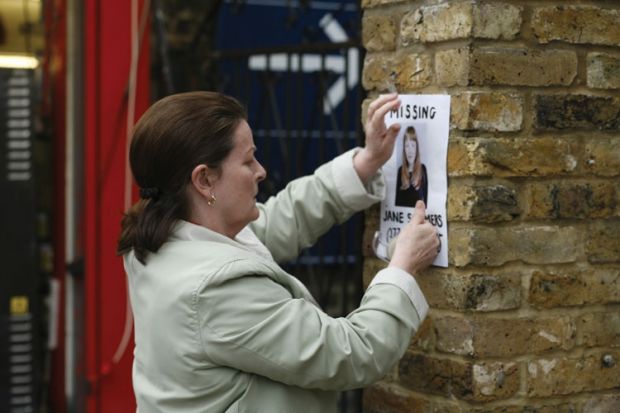A researcher is suing a university after his proposals for two conference papers questioning the definition of “missing children” were rejected.
About 10 years ago Emmanuel Lazaridis – senior information analyst at the National Institute for Cardiovascular Outcomes Research, University College London – became involved in an international battle with his American ex-wife over the custody of their daughter.
It led to the FBI asking Interpol to list his daughter as missing and to call for information on Dr Lazaridis’ whereabouts. However, since he had obtained a ruling in his favour from a court in Greece – where he had moved with his daughter – the FBI later asked Interpol to close its investigation.
This personal experience spurred Dr Lazaridis – who now lives in the UK – to look more broadly at the scale and psychological impact of what he calls “missing child fraud”, where children are “falsely advertised with posters on the internet as being missing, with requests for people to violate their private and family lives, though their location is actually known and ascertainable”.
Although this was a private rather than a university-based project, he drew on his professional expertise as a statistician in carrying out the analysis.
When the University of Portsmouth’s Institute of Criminal Justice Studies invited proposals for a conference on missing children and adults, held on 18-20 June this year, Dr Lazaridis submitted abstracts on “The Contemporaneous Experience of Missing Children” and “Missing Child Fraud: Prevalence, Policy and Legal Remedies”, the former to be written with Greek attorney Maria Kosmadaki.
The invitation for proposals was explicit that they would be “evaluated through a blind review process” looking at their “intellectual merit”, “innovative nature” and “integration of multiple aspects of the field”.
Although his papers were to present preliminary findings and had not yet been published, Dr Lazaridis said he was later assured by organisers that the content passed all tests of academic merit.
However, Dr Lazaridis received a letter informing him that his abstracts had been rejected as the result of “a separate decision of the conference co-host, the Serious Organised Crime Agency”.
It was “not believed to be appropriate” to include the proposals as “Interpol is carrying out an ongoing investigation to which you are linked”, the letter read.
He is now taking legal action against Portsmouth and a senior lecturer at the Institute of Criminal Justice Studies in the High Court, seeking damages for claims including defamation and breach of confidence.
Dr Lazaridis acknowledges that his work has uncomfortable implications for the public agencies responsible for missing children.
Yet at the heart of his claim, in Dr Lazaridis’ view, is a fundamental issue of academic freedom: “Even if I had been the worst ethical person in the world, when I make a proposal to give the results of an ongoing empirical study to a conference, it shouldn’t make any difference who the heck I am personally, provided the work I am doing is academically top-notch.”
The university declined to comment, given that legal action was ongoing. A spokesman for Soca said the conference had been organised jointly between Portsmouth, Soca’s UK Missing Persons Bureau, the Child Exploitation and Online Protection Centre and the charity Missing People.
“A steering group of representatives from the four organisations decided what academic submissions featured at the event. It would be inappropriate to comment further,” he said.
Register to continue
Why register?
- Registration is free and only takes a moment
- Once registered, you can read 3 articles a month
- Sign up for our newsletter
Subscribe
Or subscribe for unlimited access to:
- Unlimited access to news, views, insights & reviews
- Digital editions
- Digital access to THE’s university and college rankings analysis
Already registered or a current subscriber?
